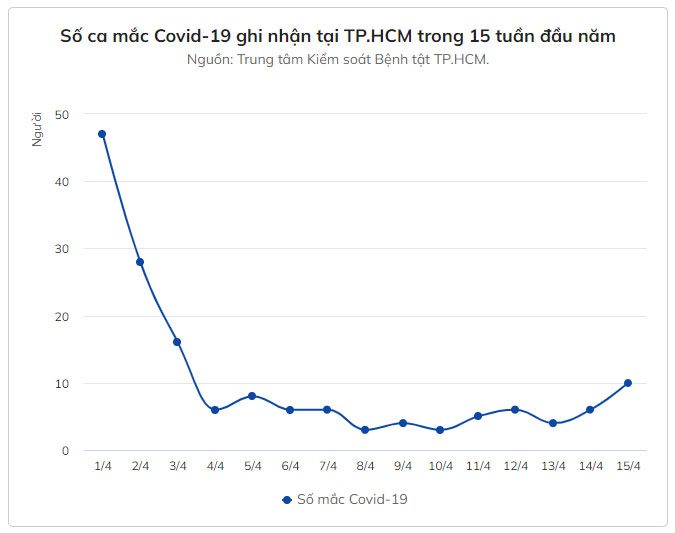In Ho Chi Minh City, since the beginning of March, the number of new Covid-19 cases reported has been below 3 per day, but a new subvariant of Omicron has emerged.
This information was shared by Dr. Nguyen Van Vinh Chau, Deputy Director of the Ho Chi Minh City Department of Health, on the morning of April 13. Additionally, the Health Department of Ho Chi Minh City noted a slight upward trend in the number of Covid-19 cases in the area.
Specifically, from April 6 to April 12, there were 6 patients diagnosed with Covid-19. However, on April 12, 3 new cases were reported, and on April 13, there were 7 cases. Currently, 12 patients are being treated in the hospital, with no severe cases requiring mechanical ventilation.
According to a report from the Oxford University Clinical Research Unit (OUCRU) in collaboration with the Ho Chi Minh City Tropical Diseases Hospital, the results of SARS-CoV-2 sequencing from positive patients (during the period from January 11 to March 20) revealed that 5 samples were successfully decoded.
Among these, there are 2 strains belonging to the subvariant BA.5 (2 out of 5, 40%), one sample of BA.2.75 (1 out of 5, 20%), one sample of XBB.1 (1 out of 5, 20%), and one sample of XBB.1.5 (1 out of 5, 20%).
Thus, Ho Chi Minh City has not reported the XBB 1.16 variant, which is highly transmissible and prevalent in India and is being closely monitored by the World Health Organization (WHO).
In an interview, Dr. Nguyen Van Vinh Chau stated that the XBB.1.5 variant was detected in Ho Chi Minh City through testing in March.
Theoretically, the emergence of a new variant usually leads to an increase in cases, forming a new wave, especially in areas where community immunity is decreasing. However, a sufficiently long observation period is needed to assess the trend of the disease, as daily fluctuations in case numbers do not reflect the overall trend.

However, with the newly detected XBB.1.5 variant in Ho Chi Minh City, the WHO indicates that this variant is currently the dominant strain globally (accounting for 47.1% of cases in March, compared to 39.8% in February).
XBB.1.5 has been detected in 94 countries. Current global analysis data show no reports of a higher severity associated with circulating variants, nor any reports of increased hospitalization or mortality in ICU departments due to any variants from the XBB lineage currently circulating.
Currently, the WHO categorizes XBB.1.5 as a variant of interest and continues to monitor it closely, along with 7 other variants under observation, including BA.2.75, CH.1.1, BQ.1, XBF, XBB, XBB.1.16, and XBB.1.9.1.
“Thus, there are currently no variants classified as variants of concern or variants causing severe consequences in the city,” the Health Department stated.
The city’s health sector urges residents to continue implementing health protection measures to maintain community immunity by vaccinating family members and children (aged 5 and above). In particular, high-risk groups should receive the Covid-19 vaccine if they have not been vaccinated, get booster shots, and receive supplemental vaccinations as per regulations.
Currently, Ho Chi Minh City remains prepared with measures to prevent and control the disease and treat Covid-19 patients. Additionally, the Ho Chi Minh City Center for Disease Control (HCDC) and OUCRU continue to conduct gene sequencing, monitoring the emergence of circulating SARS-CoV-2 variants.
During the Covid-19 situation briefing on the afternoon of April 13, Professor Dr. Phan Trong Lan, Director of the Department of Preventive Health (Ministry of Health), noted that the number of Covid-19 cases may increase in the coming period. However, we are currently at alert level 1 – all areas are green.
Mr. Lan stated that in the near future, we must closely monitor the data. The Ministry has urged provinces and cities to strengthen the review of alert levels and clearly communicate preventive measures to the public.


















































